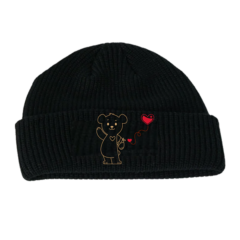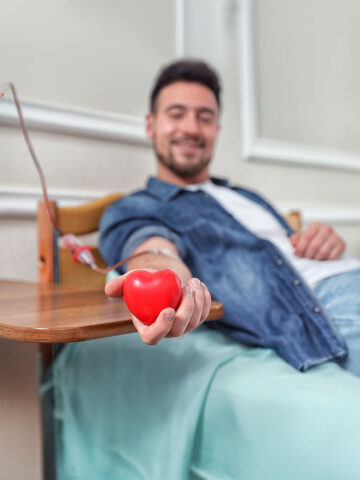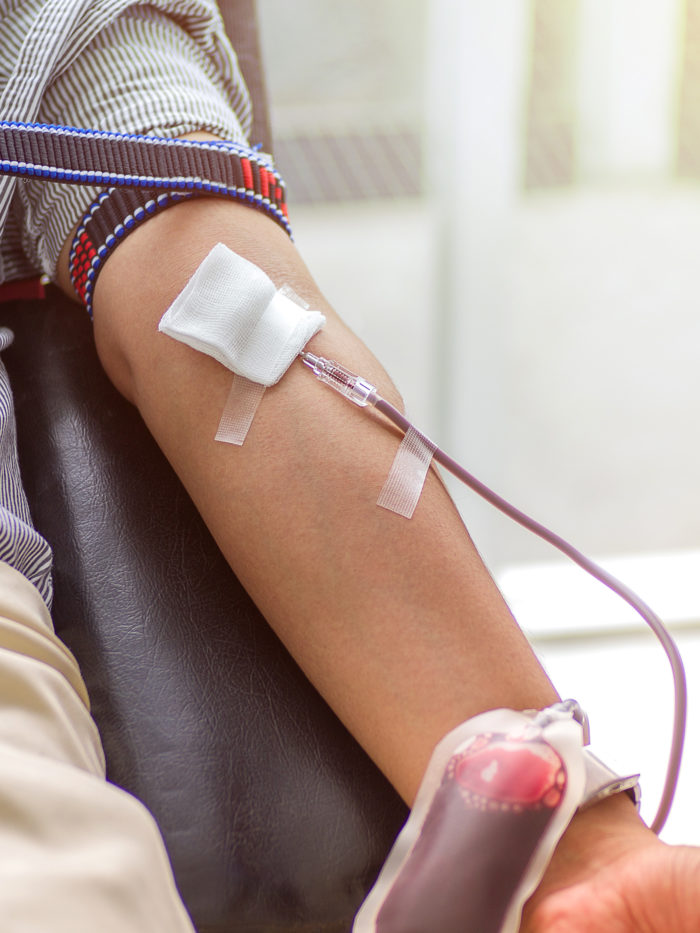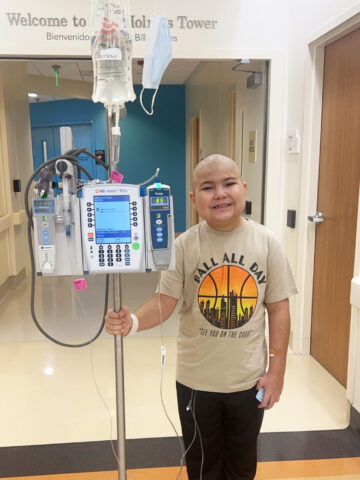Blood and Donor Services
CHOC relies on volunteer blood donors like you, your friends, neighbors and co-workers to meet the needs of our patients. Every time our volunteers donate, they leave knowing they are having direct impact on the recovery of a child. Your blood donation gives children a better chance at a healthy life.
With the support of our community, we have been able to supply 50 percent of our patients’ needs for blood transfusions, a percentage that we would love to increase. Donor recruitment is always challenging, and we want to ensure our blood and platelet inventory remains robust. Please make an appointment below or call the Blood Donor Center at 714-509-8339.
February Donation Gift
Choco Beanie

Only 17 Days
Left to Claim Gift!
Make an Appointment Today!
Same day appointments are often available and walk-ins are always welcome.
More ways to Donate
Coordinate a Blood Drive
Coordinating a blood drive is one of the best ways to support your community. Get together with your friends, work, school, church, service organization or anyone else and we will reserve time at our center specifically for your group. Coordinating a blood drive is easy to do, takes very little effort and produces big life-saving results. For more information or to set up a blood drive, call 714-509-8339.
As of now, we do not conduct mobile blood drives. All blood drives will take place exclusively at our Orange, CA location.
Designated Donor Program
CHOC offers a unique designated donor program which allows your blood donation to be directed to a specific child in need. Each unit of blood is tested and, if accepted and compatible, will be available for the specific child. No blood is ever wasted and if the donation is not compatible or the child does not need the blood at the time, it will be released to another child in need. Blood donations must be received at least four days before the child’s anticipated need. Families can set up a designated donor program by calling 714-509-8339 and then begin recruiting donors.
Donate Blood Platelets
Platelets are the component of your blood that help form clots and stop bleeding. Our children that have cancer, aplastic anemia and blood disorders especially benefit from platelets. Chemotherapy and radiation often times kills cancer and healthy cells and platelet transfusion greatly improve the outcome of our children. Platelet donations take longer than whole blood donations but this allows our donors time to relax and watch a movie or read a book.
Donate Blood Plasma
Adults who have fully recovered from COVID-19 can help children fight coronavirus by donating blood plasma at CHOC.
While researchers are still learning about the disease, it’s possible that those who have recovered from COVID-19 have produced antibodies to protect them from the infection. If so, your plasma would contain these antibodies and may be helpful in the treatment of COVID-19 disease in others.
Blood donors must:
- Be in good health
- Be at least 17 years old
- Weigh at least 110 pounds
- Have no history of hepatitis or AIDS
- Have no history of chest pain or cardiac surgery
On the day of donation:
- Bring a photo ID to the donor center
- Be free of cold and flu symptoms
- Eat a good meal within three hours of donating
- Have medications and medical conditions reviewed by the donor center staff
- Do not take aspirin, aspirin products or ibuprofen within 48 hours of donating platelets
What to expect:
- You will be given post-donation instructions and refreshments before you leave
- We will ask you questions about your medical history
- We will check your temperature, pulse, blood pressure and blood count for anemia
- Highly trained medical staff and nurses collect the blood product from your arm while you watch television, see a video, read a book or just relax
What blood types are needed?
We are currently in need of Type O and Type B blood types. Don’t know what type of blood you have? Come in and donate and we can find out for you a few days after your donation. If we are not in need of your particular blood type, you can still donate platelets or plasma. You can also help by referring a friend to make a donation or by coordinating a blood drive.
Is donating blood safe?
There is no danger in getting AIDS or other diseases from giving blood or blood products. Sterile, one-time-use disposable needles, tubing and collection bags are used to protect you. Registered nurses who are specially trained in blood collection will remain with you during the entire donation process.
What if I don't know my blood type?
You don't need to know your blood type before you donate blood. During your visit we can test for your blood type so you will know for the future.
What is the difference between whole blood, platelets and plasma donations?
The most common type of blood donation is whole blood.
Whole blood is made up of red blood cells, white blood cells and platelets which can be separated and donated to kids who suffer from sickle cell anemia or significant blood loss due to trauma or surgery.
Platelets help blood clot and control bleeding. They are used to treat leukemia and other forms of cancer. Platelet donations are done using a machine that separates the platelets from the blood and returns the blood to your body. Platelet donations take from one to two hours. Learn more about donating platelets.
Plasma is the pale yellow liquid part of whole blood and is generally transfused to replace blood-clotting proteins. Plasma donations are especially helpful from donors who have recovered from COVID-19 and can be used to help treat COVID-19 in our patients. Plasma donations are collected by a device that separates out the plasma and returns the red cells to the donor. Donating plasma typically takes about 45 to 50 minutes. Learn more about donating plasma.
How long does a blood donation take?
A whole blood donation takes about 45-60 minutes. Platelet donations take from one to two hours and plasma donations take about 45-50 minutes.
How often can I donate blood?
You can donate whole blood every 56 days. Platelets can be donated every 14 days. Plasma can be donated every 28 days.
How can I prepare for a donation?
Here are a few tips to help you prepare for your upcoming donation. Eat iron-rich foods like lean read meat or green leafy vegetables. Eat a good meal within three hours of donating. Drink extra fluids beginning 48 hours prior to your appointment.
Location:
We are located in the CHOC Commerce Tower on our Orange campus.
Download campus map: English | Spanish
505 S. Main St. Suite 185
Orange, CA 92868
Contact:
To make an appointment, you can call 714-509-8339, or email [email protected]
Blood and Donor Services Hours:
Monday and Wednesday – 7 a.m. to 5 p.m.
Tuesday and Thursday – 10 a.m. to 8 p.m.
Friday – 8 a.m. to 6 p.m.
Saturday – Open 3rd Saturday of the month, 7 a.m. to 12 p.m.
Sunday – Closed
Bone Marrow Information:
e-mail: [email protected] or call 1-800-627-7692
Tips from our Experts
Blood Donations
The journey of donated blood
Discover the journey of donated blood at Rady Children’s, from donation and testing to transfusion, and how it safely helps children in need of medical...
Blood Donations
Why you should consider becoming a blood donor
January is National Blood Donor Month. But at CHOC, blood donations are needed all year long. For more information call: 714-509-8339
Blood Donations
Blood donors appreciated by CHOC patients like Joshua
Joshua needs multiple blood transfusions for his cancer treatment, which are made possible by blood and platelet donations to CHOC.


